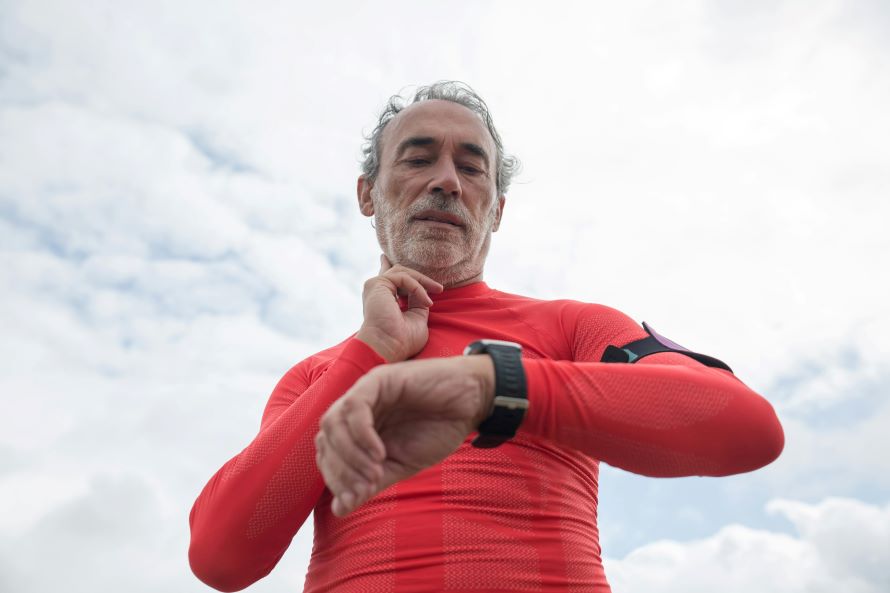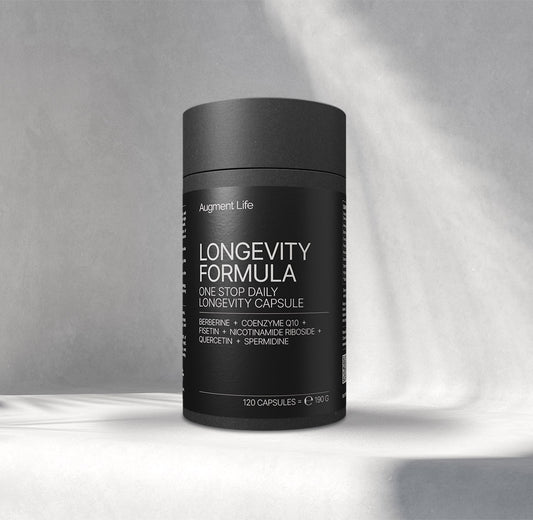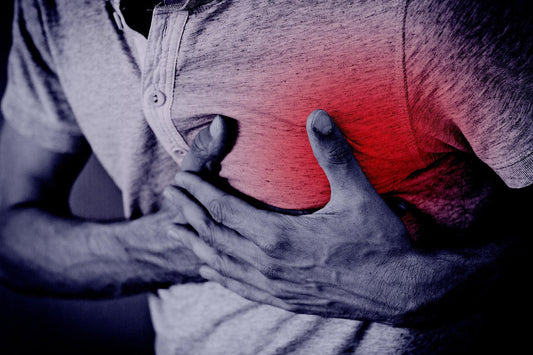Have you ever wondered how exercise and supplements impact your body’s aging process? Both target key biological pathways that influence longevity but in different ways. How do these two approaches work, and can they complement each other to promote healthy aging?
If you want to know more about how to live a longer and healthier life, keep reading!
Exercise and longevity
When it comes to enhancing longevity, both exercise and supplements play essential but distinct roles. Exercise is a well-established factor in promoting a longer, healthier life.
Physical activities can:
- improve cardiovascular health,
- strengthen muscles,
- boost immunity,
- support emotional and mental health,
- prevent chronic conditions like heart disease, diabetes, and obesity, all of which are linked to a shortened lifespan.
The benefits of exercise are well supported by studies and research that prove that regular physical activity is responsible for improving quality of life (1).
How does exercise benefit your health?
Exercise benefits your health through multiple molecular pathways:
- Energy balance (AMP-activated protein kinase (AMPK)): responsible for metabolic adaptations by controlling the uptake of glucose and fatty acids by the cell.
- Sirtuins: exercise activates proteins called sirtuins, protecting cells from inflammatory responses and oxidative stress and regulating mitochondrial function.
- Decrease inflammation: regular physical activity reduces the risk of chronic and metabolic diseases and is used for prevention and treatment.
In short, regular exercise supports healthy aging by protecting your cells, improving metabolism, and reducing harmful inflammation! If you want to learn more about these molecular pathways, simply click on their names to read more.
Supplementation and longevity
Longevity supplements focus on specific biochemical pathways related to age. People who take antioxidants and eat a healthy diet or supplementation have demonstrated a lower risk of chronic diseases such as cardiac conditions.
It is good to remember that food is essential for survival. However, nutritional deficiency can occur even with a high-quality lifestyle, so supplementation is a good choice to keep your body healthy.
Supplements, particularly those aimed at longevity, target many of the same pathways but often do so more directly. For example:
- Resveratrol: found in the skin of red grapes, red wine, and berries. Activated proteins such as sirtuins act like antioxidants, protecting the cell from oxidative stress damage.
- NAD-Boosting molecules (e.g. NMN): in several studies, supplementation with NMN has suppressed age-related adipose tissue inflammation, increased insulin secretion and insulin action, and improved mitochondrial and neuronal function. It is linked to producing benefits in diverse conditions, such as diabetes and Alzheimer's disease.
- Fisetin: is a bioactive flavonoid molecule known for its wide range of benefits. Fisetin has been shown to reduce signs of cellular aging and related inflammation in multiple tissues.
In short, longevity supplements support healthy aging by boosting energy, protecting cells, and fighting inflammation (3). Find them in our shop:
- Resveratrol - various dosages available,
- Nicotinamide Mononucleotide NMN - 500 mg capsules,
- Fisetin - 400 mg capsules.
Comparing their roles
While exercise provides health benefits by naturally enhancing the body's resilience, supplements target specific mechanisms that may boost the effects of exercise or compensate for aging-related declines in those pathways.
Exercise is an integrated approach that involves everything from heart to cognitive function. This is different from supplements that have a more specific mechanism of action, usually addressing oxidative stress and inflammation.
When thinking about optimal results, it is important to discuss the combination of regular exercise and longevity supplements. Regular physical activity is responsible for reducing the risk of major disabilities as we get older. Exercise offers more benefits than just keeping us physically strong. Physical activity also maintains our brain health by improving meaningful social connections (4,5).
So, instead of thinking of exercise as just a way to prevent frailty, we should see it as a key to staying sharp and socially engaged as we get older (5). Supplements can help enhance the benefits of exercise, but they can never replace it.
Do supplements cancel the effects of exercise?
There has been an ongoing debate on whether resveratrol and some other supplements cancel the benefits that exercise offers, probably by acting on opposite pathways.
As it turns out, there hasn't been much scientific proof that resveratrol or other antioxidant supplements can do that. The only exceptions are vitamins C and E, as it has been scientifically proven that taking them while exercising can reduce the positive effects of exercise.
Read more about why this happens here.
AMPK activation
AMPK is an important enzyme that regulates the body's energy balance at the cellular level. For example, it increases the body´s energy when levels are low. AMPK uses stored fat and glucose to maintain optimal energy balance. Additionally, the AMPK molecular pathway is responsible for improving insulin sensitivity and helping the body better regulate blood sugar levels.
Both exercise and supplementation have the potential to activate the AMPK pathway. Clinical research supports the well-known fact that exercise, especially endurance exercises like running, cycling, or high-intensity training, activates AMPK (6).
When discussing the activation of AMPK using supplementation like resveratrol or berberine, we can say that these supplements have been shown to activate AMPK in both animal models and human clinical trials. While evidence from human trials is promising, more research is still needed (7,8). We especially don't yet understand whether exercise, supplements, fasting, or something else, is most effective when activating AMPK.
Read more about the AMPK molecular pathway and its activation patterns here.
Conclusion
In conclusion, combining exercise with supplements is an effective non-pharmacological option to treat a lot of diseases and conditions. It is impressive how diet and exercise could influence metabolic parameters and increase the quality of life and longevity.
The future of health and medicine is focused on combining vital elements that can bring us better results. These fundamental elements are essential to keep us alive and enhance our overall quality of life. For example:
- smart nutrition,
- effective dietary supplements,
- regular physical activity,
- mental engagement,
- positive lifestyle changes (9).
Making better lifestyle choices by nourishing our bodies, keeping our minds connected, and staying active will support our well-being for a long time.
When we discover the potential of these interconnected areas, we can pave the way for a vibrant, fulfilling life well into our later years. So, let’s embrace this integrated approach and unlock the potential for a longer, healthier, and happier future!
Literature sources:
- Garatachea N, Pareja-Galeano H, Sanchis-Gomar F, Santos-Lozano A, Fiuza-Luces C, Morán M, Emanuele E, Joyner MJ, Lucia A. Exercise attenuates the major hallmarks of aging. Rejuvenation Res. 2015 Feb;18(1):57-89. doi: 10.1089/rej.2014.1623.
- Yousefzadeh MJ, Zhu Y, McGowan SJ, Angelini L, Fuhrmann-Stroissnigg H, Xu M, Ling YY, Melos KI, Pirtskhalava T, Inman CL, McGuckian C, Wade EA, Kato JI, Grassi D, Wentworth M, Burd CE, Arriaga EA, Ladiges WL, Tchkonia T, Kirkland JL, Robbins PD, Niedernhofer LJ. Fisetin is a senotherapeutic that extends health and lifespan. EBioMedicine. 2018 Oct;36:18-28. doi: 10.1016/j.ebiom.2018.09.015.
- Chen Y, Hamidu S, Yang X, Yan Y, Wang Q, Li L, Oduro PK, Li Y. Dietary Supplements and Natural Products: An Update on Their Clinical Effectiveness and Molecular Mechanisms of Action During Accelerated Biological Aging. Front Genet. 2022 Apr 28;13:880421. doi: 10.3389/fgene.2022.880421.
- Pahor M, Guralnik JM, Ambrosius WT, et al. Effect of Structured Physical Activity on Prevention of Major Mobility Disability in Older Adults: The LIFE Study Randomized Clinical Trial. JAMA. 2014;311(23):2387–2396. doi:10.1001/jama.2014.5616.
- Viña J, Rodriguez-Mañas L, Salvador-Pascual A, Tarazona-Santabalbina FJ, Gomez-Cabrera MC. Exercise: the lifelong supplement for healthy ageing and slowing down the onset of frailty. J Physiol. 2016 Apr 15;594(8):1989-99. doi: 10.1113/JP270536.
- Spaulding HR, Yan Z. AMPK and the Adaptation to Exercise. Annu Rev Physiol. 2022 Feb 10;84:209-227. doi: 10.1146/annurev-physiol-060721-095517.
- Yin J, Xing H, Ye J. Efficacy of berberine in patients with type 2 diabetes mellitus. Metabolism. 2008 May;57(5):712-7. doi: 10.1016/j.metabol.2008.01.013.
- Bonnefont-Rousselot D. Resveratrol and Cardiovascular Diseases. Nutrients. 2016 May 2;8(5):250. doi: 10.3390/nu8050250.
- Fekete M, Lehoczki A, Tarantini S, Fazekas-Pongor V, Csípő T, Csizmadia Z, Varga JT. Improving Cognitive Function with Nutritional Supplements in Aging: A Comprehensive Narrative Review of Clinical Studies Investigating the Effects of Vitamins, Minerals, Antioxidants, and Other Dietary Supplements. Nutrients. 2023 Dec 15;15(24):5116. doi: 10.3390/nu15245116.











